#Cory Doctorow
Text
TOR WRAPPED 2023
Books for every Spotify Wrapped listener class!

VAMPIRE
Masters of Death by Olivie Blake
Starling House by Alix E. Harrow
Mordew by Alex Pheby
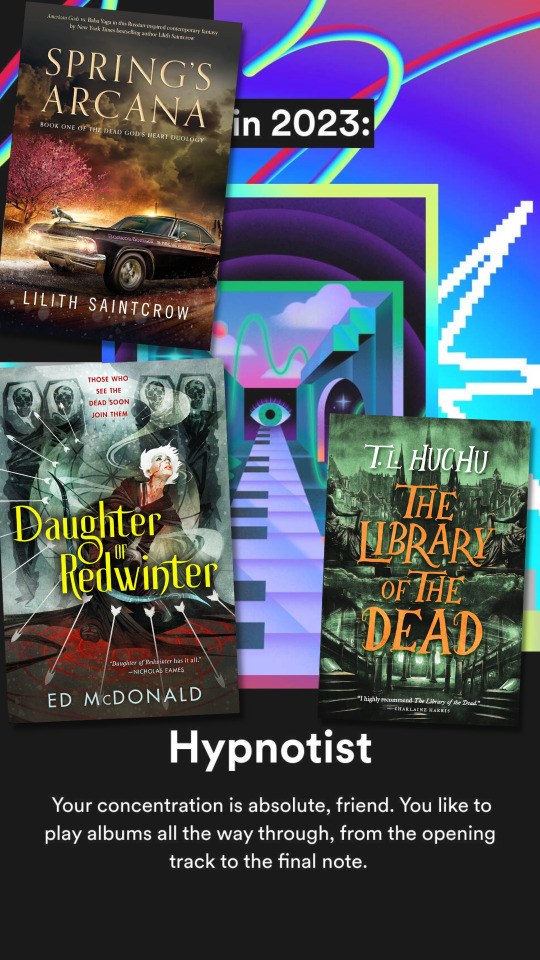
HYPNOTIST
The Library of the Dead by T. L. Huchu
Daughter of Redwinter by Ed McDonald
Spring’s Arcana by Lilith Saintcrow
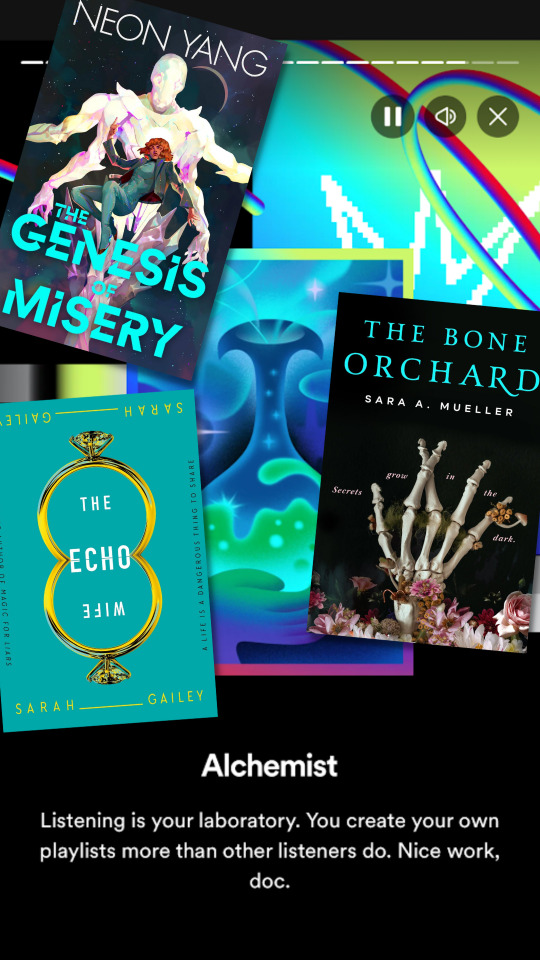
ALCHEMIST
The Bone Orchard by Sara A. Mueller
The Genesis of Misery by Neon Yang
The Echo Wife by Sarah Gailey
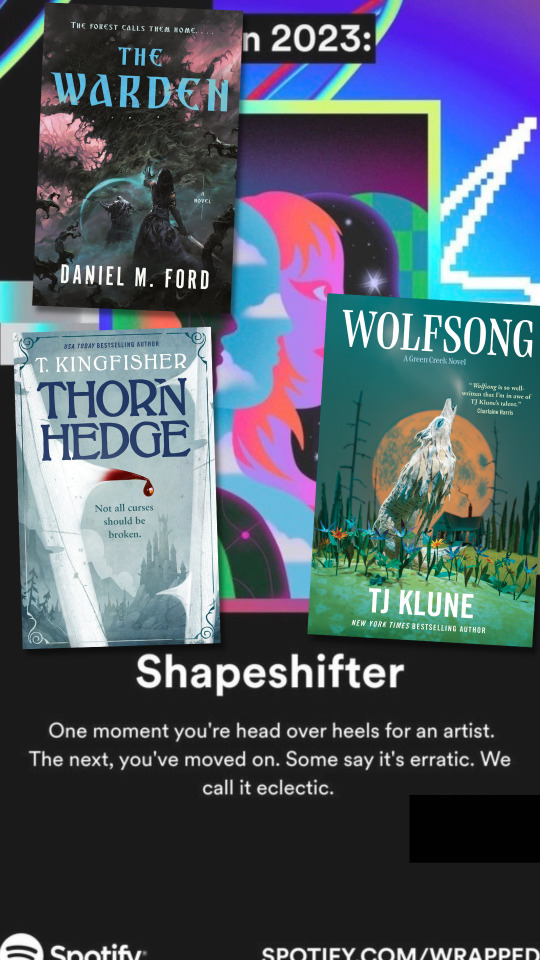
SHAPESHIFTER
Thornhedge by T. Kingfisher
The Warden by Daniel M. Ford
Wolfsong by TJ Klune
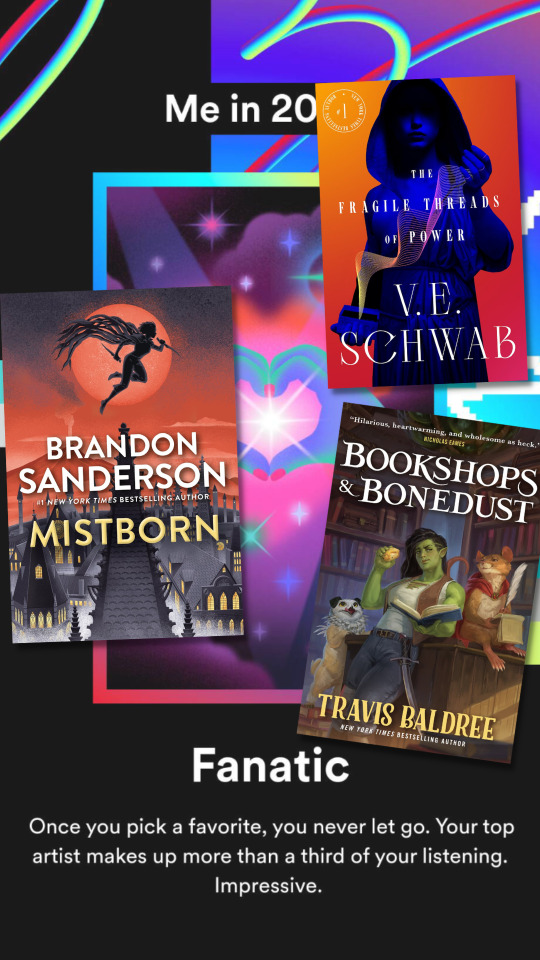
FANATIC
Mistborn by Brandon Sanderson
Bookshops & Bonedust by Travis Baldree
The Fragile Threads of Power by V. E. Schwab
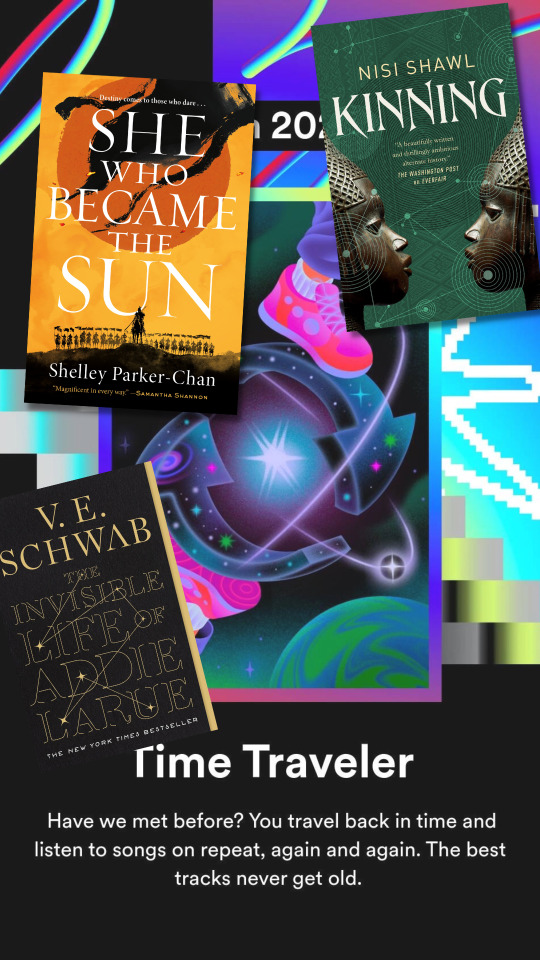
TIME TRAVELER
Kinning by Nisi Shawl
She Who Became the Sun by Shelley Parker-Chan
The Invisible Life of Addie LaRue by V. E. Schwab
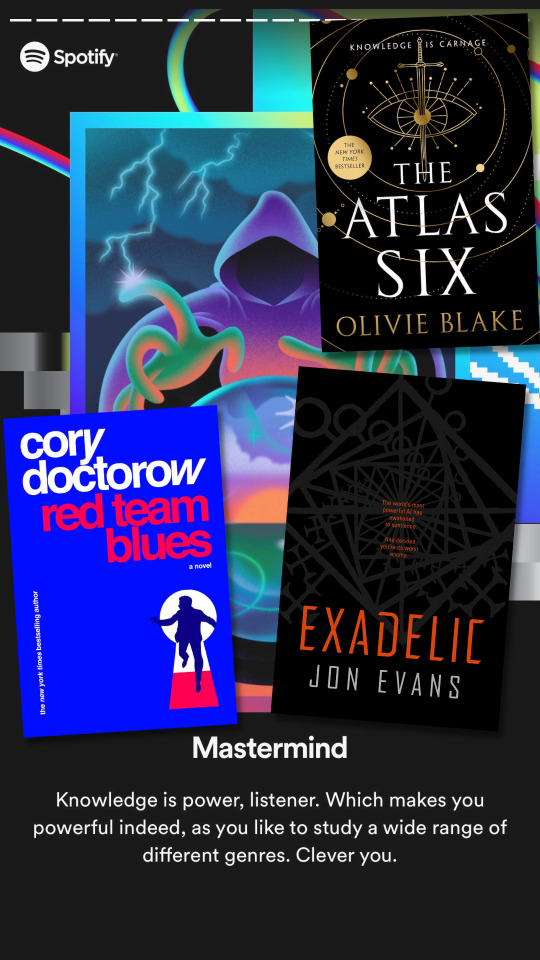
MASTERMIND
The Atlas Six by Olivie Blake
Red Team Blues by Cory Doctorow
Exadelic by Jon Evans
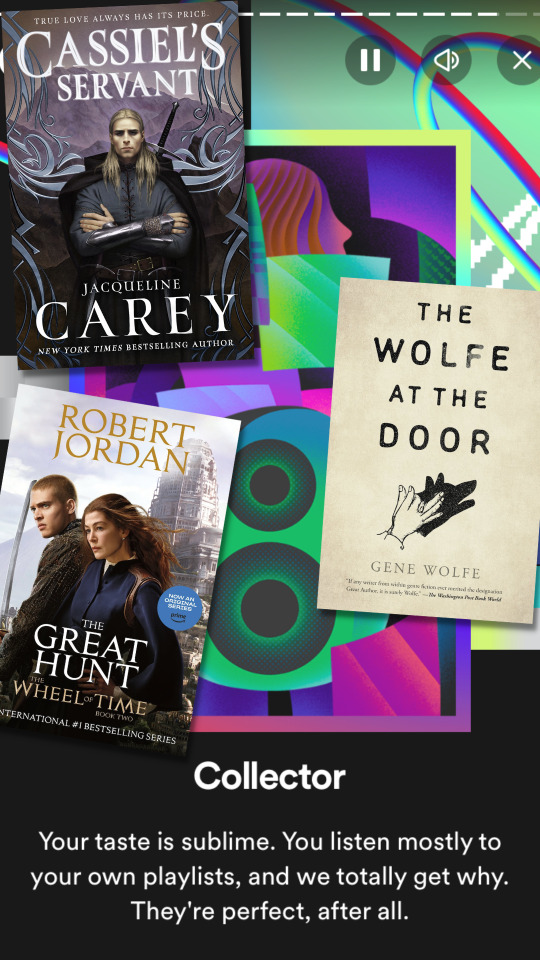
COLLECTOR
The Wolfe at the Door by Gene Wolfe
Cassiel’s Servant by Jacqueline Carey
The Great Hunt by Robert Jordan
#spotify#spotify wrapped#tor books#the great hunt#the wolfe at the door#cassiel's servant#jacqueline carey#robert jordan#gene wolfe#exadelic#jon evans#red team blues#cory doctorow#the atlas six#olivie blake#kinning#nisi shawl#she who became the sun#shelley parker-chan#the invisible life of addie larue#v e schwab#mistborn#brandon sanderson#bookshops & bonedust#travis baldree#the fragile threads of power#thornhedge#t kingfisher#ursula vernon#wolfsong
5K notes
·
View notes
Quote
Keeping a "writer's notebook" in public imposes an unbeatable rigor, since you can't slack off and leave notes so brief and cryptic that they neither lodge in your subconscious nor form a record clear enough to refer to in future. By contrast, keeping public notes produces both a subconscious, supersaturated solution of fragmentary ideas that rattle around, periodically cohering into nucleii that crystallize into full-blown ideas
Cory Doctorow
225 notes
·
View notes
Text
Catch me at San Francisco Public Library on Mar 13, discussing my new novel "The Bezzle" with Robin Sloan!
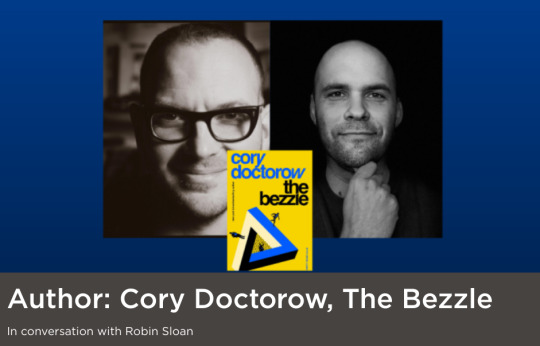
At long last, the San Francisco stop of the book tour for my new novel The Bezzle has been finalized: I'll be at the San Francisco Public Library Main Branch on Wednesday, March 13th, in conversation with Robin Sloan!
The event starts at 6PM with Cooper Quintin from the Electronic Frontier Foundation, talking about the real horrors of the prison-tech industry, which I fictionalize in The Bezzle.
Attentive readers will know that this event was finalized very late in the day, and it's going to need a little help, given the short timeline. Please consider coming - and be sure to tell your Bay Area friends about the gig!
Wednesday, 3/13/2024
6:00 - 7:30
Koret Auditorium
Main Library
100 Larkin Street
San Francisco, CA 94102
#the bezzle#martin hench#san francisco#public libraries#libraries#sfpl#san francisco public library#robin sloan#cory doctorow
178 notes
·
View notes
Text
Cory Doctorow: “If you were unfortunate enough to e-file your US tax using HR Block, Taxact or Taxslayer, your most sensitive financial information was nonconsenually shared with Facebook, where it was added to the involuntary dossier the company maintains billions of people, including people who don't have Facebook accounts.”
#Pluralistic#Cory Doctorow#IRS#taxes#HR Block#Taxact#Taxslayer#Facebook#privacy#monopoly#politics#US politics#Grover Norquist#income tax#US income tax
2K notes
·
View notes
Text
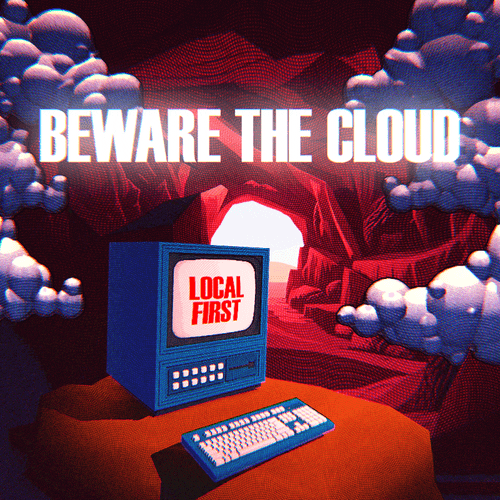
Cloud computing and software as a service are a choice. "Local first" computing is possible, and desirable.
- Cory Doctorow
91 notes
·
View notes
Text
"Monetize" is a terrible word that tacitly admits that there is no such thing as an "attention economy." You can't use attention as a medium of exchange. You can't use it as a store of value. You can't use it as a unit of account. Attention is like cryptocurrency: a worthless token that is only valuable to the extent that you can trick or coerce someone into parting with "fiat" currency in exchange for it. You have to "monetize" it—that is, you have to exchange the fake money for real money.
-Cory Doctrow, The ‘Enshittification’ of TikTok
50 notes
·
View notes
Text
On "The Lost Cause" by Cory Doctorow
tl;dr - The Lost Cause is an worthwhile read that provides a feeling of hope for the future. As with many novels by Cory Doctorow, it takes place in the near future and showcases one possible future.
A future where humanity is taking the drastic actions needed to manage the fallout of the climate crisis. But also a future where humanity is dealing with the backlash from the older crowd that fears change and the plutocrats that fund them.
The story is told from the point of view of Brooks Palazzo, a young adult living in Burbank California thirty years from now. The Green New Deal has passed, and he is part of the "first generation that doesn’t fear the future". He wants to make a difference in the world by joining the Blue Helmets AmeriCorps and helping to rebuild the lower half of San Juan Capistrano a mile inland.
Not everything is all rainbows and roses, however. Brook's grandfather and his Maga pals aren't huge fans of the changing world though. Neither are the plutocrats that lost out due to the GND...
You can get a copy of the ebook or audiobook directly from the author here. You can also buy the audiobook from libro.fm or get a physical copy from bookshop.org as a hardcover now or pre-order the paperback. You can also check and see if your local library has a copy.
This is going to be less of a review and more of an admiration for a specific trope that is masterfully used. Due to the nature of the trope, there will be spoilers, including major plot points near the climax of the novel. If you want to go in blind, stop reading now.
"If you say in the first chapter that there is a rifle hanging on the wall, in the second or third chapter it absolutely must go off. If it's not going to be fired, it shouldn't be hanging there."
— Anton Chekhov (From S. Shchukin, Memoirs. 1911.)
So, Chekhov's Gun. It's a guideline when writing narrative fiction that is commonly interpreted as: every element in a story should be needed, and anything that isn't needed should be removed. You could probably also think of it as a form of foreshadowing, but I'm not an author nor an authority on narrative fiction.
Anyway, spoiler alert - Brooks' grandfather dies during chapter one of the novel. As is common when a family member dies, the living have the chore of sorting through a lifetime's worth of items. As Brooks is the sole remaining person in his family, that task falls to him.
This leads to the below setup for the trope:
I felt around the edge and found a length of floorboard that wasn’t stuck down, and beneath it, a heavy nylon loop. I hauled on it and a square of floor lifted straight up, revealing Gramps’s secret.
He’d jackhammered away a neat square of foundation slab, dug down about four feet, and poured a concrete vault, which he’d filled with: three AR-15s; forty boxes of ammo; a bag of expired high-strength antibiotics; a wilderness survival kit identical to the one he’d given me for my first Scout sleepout, including the hatchet my Scoutmaster had confiscated before we got on the bus; topographical maps of LA County; and, wrapped in oilcloth, a wooden box like you’d keep poker chips in, but this was full of krugerrands, heavy and glinting dully, dated mostly from the first and second decades of this century.
As guns are now illegal, this leads to Brooks stashing the guns, ammo, and gold in the hills of California by page 80. They get mentioned a few times throughout the novel, reminding you of their existence, but don't become really relevant to the plot until right before the climax.
A part of the story that almost feels like it could be the climax.
A group of Maga terrorists have taken Brooks' friends hostage. Brooks decides that in order to save his friends he has to go into the California hills and get the guns.
This, turns out, was not necessary. In fact, it's revealed later that the likeliest outcome of trying to perform an armed rescue would have been his death.
So, it comes to pass that the guns were introduced in the first act, and were subsequently not fired in the third.
The scene that completes the arc of trope:
That was what my grandfather had raised me to expect: a final confrontation, an all-out war, a battle for the future of the human race and its planet. That was what he was planning for, and right up until that moment, as I cleaned off his guns and hid them in the construction waste, I had never really considered the possibility that he’d been wrong. I’d thought there’d be a war with two sides: Gramps’s side and mine. I’d never thought that the real war would be between the people who refused to go to war and the fools who thought they could shoot climate change in the face.
So we have the setup, the implication that the guns will be used later in the novel. Only, they don't get used. They're practically useless, and almost actively harmful. But, given the themes and messaging of the book, the guns being useless is the only possible outcome. The subversion of this trope[0] drives the point home. Having some kind of final showdown isn't the message. Individuals storming the building with guns to to save the day would fly counter to the message of collective action being the way we move forward.
The message I took from the book was that building shelter for refugees is the way forward, even if doing that gets you arrested.
That feeding the hungry is the way forward, even if you get fined for it.
That taking care of people, even if those people were previously pointing a gun at you, is the way forward. (note: ensuring that they don't have access to their guns anymore is wise.)
The only way forward is to build the systems of mutual aid now, even if building those systems will be fraught with adversity and challenges.
No matter what happens, we will always be building the future in the shadow of the present. Only with collective action can we move forward, and only if we take care of each other.
[0] so, I'm not entirely convinced that this is really a subversion of the trope. While the guns aren't fired, they are necessary to the plot in the latter part of the book. But again, I am not an author nor an authority on narrative fiction.
30 notes
·
View notes
Text

‘Enshittification’ is coming for absolutely everything
Cory Doctorow: Last year, I coined the term “enshittification” to describe the way that platforms decay. That obscene little word did big numbers; it really hit the zeitgeist. The American Dialect Society made it its Word of the Year for 2023 (which, I suppose, means that now I’m definitely getting a poop emoji on my tombstone). So what’s enshittification and why did it catch fire? It’s my theory explaining how the internet was colonised by platforms, why all those platforms are degrading so quickly and thoroughly, why it matters and what we can do about it. We’re all living through a great enshittening, in which the services that matter to us, that we rely on, are turning into giant piles of shit. It’s frustrating. It’s demoralising. It’s even terrifying.
I think that the enshittification framework goes a long way to explaining it, moving us out of the mysterious realm of the “great forces of history”, and into the material world of specific decisions made by real people; decisions we can reverse and people whose names and pitchfork sizes we can learn. Enshittification names the problem and proposes a solution. It’s not just a way to say “things are getting worse”, though, of course, it’s fine with me if you want to use it that way. (It’s an English word. We don’t have ein Rat für englische Rechtschreibung. English is a free-for-all. Go nuts, meine Kerle.) But in case you want to be more precise, let’s examine how enshittification works. It’s a three-stage process: first, platforms are good to their users. Then they abuse their users to make things better for their business customers. Finally, they abuse those business customers to claw back all the value for themselves. Then, there is a fourth stage: they die. Let’s do a case study. What could be better than Facebook?
Facebook arose from a website developed to rate the fuckability of Harvard undergrads, and it only got worse after that. When Facebook started off, it was only open to US college and high-school kids with .edu and K-12.us addresses. But in 2006, it opened up to the general public. It effectively told them: Yes, I know you’re all using MySpace. But MySpace is owned by a billionaire who spies on you with every hour that God sends. Sign up with Facebook and we will never spy on you. Come and tell us who matters to you in this world.
That was stage one. Facebook had a surplus — its investors’ cash — and it allocated that surplus to its end users. Those end users proceeded to lock themselves into Facebook. Facebook, like most tech businesses, had network effects on its side. A product or service enjoys network effects when it improves as more people sign up to use it. You joined Facebook because your friends were there, and then others signed up because you were there.
But Facebook didn’t just have high network effects, it had high switching costs. Switching costs are everything you have to give up when you leave a product or service. In Facebook’s case, it was all the friends there that you followed and who followed you. In theory, you could have all just left for somewhere else; in practice, you were hamstrung by the collective action problem. It’s hard to get lots of people to do the same thing at the same time. So Facebook’s end users engaged in a mutual hostage-taking that kept them glued to the platform. Then Facebook exploited that hostage situation, withdrawing the surplus from end users and allocating it to two groups of business customers: advertisers and publishers.
To the advertisers, Facebook said: Remember when we told those rubes we wouldn’t spy on them? Well, we do. And we will sell you access to that data in the form of fine-grained ad-targeting. Your ads are dirt cheap to serve, and we’ll spare no expense to make sure that when you pay for an ad, a real human sees it. To the publishers, Facebook said: Remember when we told those rubes we would only show them the things they asked to see? Ha! Upload short excerpts from your website, append a link and we will cram it into the eyeballs of users who never asked to see it. We are offering you a free traffic funnel that will drive millions of users to your website to monetise as you please. And so advertisers and publishers became stuck to the platform, too.
Users, advertisers, publishers — everyone was locked in. Which meant it was time for the third stage of enshittification: withdrawing surplus from everyone and handing it to Facebook’s shareholders. For the users, that meant dialling down the share of content from accounts you followed to a homeopathic dose, and filling the resulting void with ads and pay-to-boost content from publishers. For advertisers, that meant jacking up prices and drawing down anti-fraud enforcement, so advertisers paid much more for ads that were far less likely to be seen. For publishers, this meant algorithmically suppressing the reach of their posts unless they included an ever-larger share of their articles in the excerpt. And then Facebook started to punish publishers for including a link back to their own sites, so they were corralled into posting full text feeds with no links, meaning they became commodity suppliers to Facebook, entirely dependent on the company both for reach and for monetisation.
When any of these groups squawked, Facebook just repeated the lesson that every tech executive learnt in the Darth Vader MBA: “I have altered the deal. Pray I don’t alter it any further.” Facebook now enters the most dangerous phase of enshittification. It wants to withdraw all available surplus and leave just enough residual value in the service to keep end users stuck to each other, and business customers stuck to end users, without leaving anything extra on the table, so that every extractable penny is drawn out and returned to its shareholders. (This continued last week, when the company announced a quarterly dividend of 50 cents per share and that it would increase share buybacks by $50bn. The stock jumped.)
But that’s a very brittle equilibrium, because the difference between “I hate this service, but I can’t bring myself to quit,” and “Jesus Christ, why did I wait so long to quit?” is razor-thin.
[Thanks Robert Scott Horton]
27 notes
·
View notes
Text
“This is the final inversion of blogging: not just publishing before selecting, nor researching before knowing your subject — but producing to attract, rather than serve, an audience. Traditional editors identify an audience who will pay for their publication (or whom an advertiser will pay to reach) and then find a writer who can speak to that audience. As a blogger, I’ve enjoyed the delirious freedom to write exactly the publication I’d want to read, which then attracts other people who feel the same way.”
17 notes
·
View notes
Text
Podcasting "How To Think About Scraping"

On September 27, I'll be at Chevalier's Books in Los Angeles with Brian Merchant for a joint launch for my new book The Internet Con and his new book, Blood in the Machine. On October 2, I'll be in Boise to host an event with VE Schwab.

This week on my podcast, I read my recent Medium column, "How To Think About Scraping: In privacy and labor fights, copyright is a clumsy tool at best," which proposes ways to retain the benefits of scraping without the privacy and labor harms that sometimes accompany it:
https://doctorow.medium.com/how-to-think-about-scraping-2db6f69a7e3d?sk=4a1d687171de1a3f3751433bffbb5a96
What are those benefits from scraping? Well, take computational linguistics, a relatively new discipline that is producing the first accounts of how informal language works. Historically, linguists overstudied written language (because it was easy to analyze) and underanalyzed speech (because you had to record speakers and then get grad students to transcribe their dialog).
The thing is, very few of us produce formal, written work, whereas we all engage in casual dialog. But then the internet came along, and for the first time, we had a species of mass-scale, informal dialog that also written, and which was born in machine-readable form.
This ushered in a new era in linguistic study, one that is enthusiastically analyzing and codifying the rules of informal speech, the spread of vernacular, and the regional, racial and class markers of different kinds of speech:
https://memex.craphound.com/2019/07/24/because-internet-the-new-linguistics-of-informal-english/
The people whose speech is scraped and analyzed this way are often unreachable (anonymous or pseudonymous) or impractical to reach (because there's millions of them). The linguists who study this speech will go through institutional review board approvals to make sure that as they produce aggregate accounts of speech, they don't compromise the privacy or integrity of their subjects.
Computational linguistics is an unalloyed good, and while the speakers whose words are scraped to produce the raw material that these scholars study, they probably wouldn't object, either.
But what about entities that explicitly object to being scraped? Sometimes, it's good to scrape them, too.
Since 1996, the Internet Archive has scraped every website it could find, storing snapshots of every page it found in a giant, searchable database called the Wayback Machine. Many of us have used the Wayback Machine to retrieve some long-deleted text, sound, image or video from the internet's memory hole.
For the most part, the Internet Archive limits its scraping to websites that permit it. The robots exclusion protocol (AKA robots.txt) makes it easy for webmasters to tell different kinds of crawlers whether or not they are welcome. If your site has a robots.txt file that tells the Archive's crawler to buzz off, it'll go elsewhere.
Mostly.
Since 2017, the Archive has started ignoring robots.txt files for news services; whether or not the news site wants to be crawled, the Archive crawls it and makes copies of the different versions of the articles the site publishes. That's because news sites – even the so-called "paper of record" – have a nasty habit of making sweeping edits to published material without noting it.
I'm not talking about fixing a typo or a formatting error: I'm talking about making a massive change to a piece, one that completely reverses its meaning, and pretending that it was that way all along:
https://medium.com/@brokenravioli/proof-that-the-new-york-times-isn-t-feeling-the-bern-c74e1109cdf6
This happens all the time, with major news sites from all around the world:
http://newsdiffs.org/examples/
By scraping these sites and retaining the different versions of their article, the Archive both detects and prevents journalistic malpractice. This is canonical fair use, the kind of copying that almost always involves overriding the objections of the site's proprietor. Not all adversarial scraping is good, but this sure is.
There's an argument that scraping the news-sites without permission might piss them off, but it doesn't bring them any real harm. But even when scraping harms the scrapee, it is sometimes legitimate – and necessary.
Austrian technologist Mario Zechner used the API from country's super-concentrated grocery giants to prove that they were colluding to rig prices. By assembling a longitudinal data-set, Zechner exposed the raft of dirty tricks the grocers used to rip off the people of Austria.
From shrinkflation to deceptive price-cycling that disguised price hikes as discounts:
https://mastodon.gamedev.place/@badlogic/111071627182734180
Zechner feared publishing his results at first. The companies whose thefts he'd discovered have enormous power and whole kennelsful of vicious attack-lawyers they can sic on him. But he eventually got the Austrian competition bureaucracy interested in his work, and they published a report that validated his claims and praised his work:
https://mastodon.gamedev.place/@badlogic/111071673594791946
Emboldened, Zechner open-sourced his monitoring tool, and attracted developers from other countries. Soon, they were documenting ripoffs in Germany and Slovenia, too:
https://mastodon.gamedev.place/@badlogic/111071485142332765
Zechner's on a roll, but the grocery cartel could shut him down with a keystroke, simply by blocking his API access. If they do, Zechner could switch to scraping their sites – but only if he can be protected from legal liability for nonconsensually scraping commercially sensitive data in a way that undermines the profits of a powerful corporation.
Zechner's work comes at a crucial time, as grocers around the world turn the screws on both their suppliers and their customers, disguising their greedflation as inflation. In Canada, the grocery cartel – led by the guillotine-friendly hereditary grocery monopolilst Galen Weston – pulled the most Les Mis-ass caper imaginable when they illegally conspired to rig the price of bread:
https://en.wikipedia.org/wiki/Bread_price-fixing_in_Canada
We should scrape all of these looting bastards, even though it will harm their economic interests. We should scrape them because it will harm their economic interests. Scrape 'em and scrape 'em and scrape 'em.
Now, it's one thing to scrape text for scholarly purposes, or for journalistic accountability, or to uncover criminal corporate conspiracies. But what about scraping to train a Large Language Model?
Yes, there are socially beneficial – even vital – uses for LLMs.
Take HRDAG's work on truth and reconciliation in Colombia. The Human Rights Data Analysis Group is a tiny nonprofit that makes an outsized contribution to human rights, by using statistical methods to reveal the full scope of the human rights crimes that take place in the shadows, from East Timor to Serbia, South Africa to the USA:
https://hrdag.org/
HRDAG's latest project is its most ambitious yet. Working with partner org Dejusticia, they've just released the largest data-set in human rights history:
https://hrdag.org/jep-cev-colombia/
What's in that dataset? It's a merger and analysis of more than 100 databases of killings, child soldier recruitments and other crimes during the Colombian civil war. Using a LLM, HRDAG was able to produce an analysis of each killing in each database, estimating the probability that it appeared in more than one database, and the probability that it was carried out by a right-wing militia, by government forces, or by FARC guerrillas.
This work forms the core of ongoing Colombian Truth and Reconciliation proceedings, and has been instrumental in demonstrating that the majority of war crimes were carried out by right-wing militias who operated with the direction and knowledge of the richest, most powerful people in the country. It also showed that the majority of child soldier recruitment was carried out by these CIA-backed, US-funded militias.
This is important work, and it was carried out at a scale and with a precision that would have been impossible without an LLM. As with all of HRDAG's work, this report and the subsequent testimony draw on cutting-edge statistical techniques and skilled science communication to bring technical rigor to some of the most important justice questions in our world.
LLMs need large bodies of text to train them – text that, inevitably, is scraped. Scraping to produce LLMs isn't intrinsically harmful, and neither are LLMs. Admittedly, nonprofits using LLMs to build war crimes databases do not justify even 0.0001% of the valuations that AI hypesters ascribe to the field, but that's their problem.
Scraping is good, sometimes – even when it's done against the wishes of the scraped, even when it harms their interests, and even when it's used to train an LLM.
But.
Scraping to violate peoples' privacy is very bad. Take Clearview AI, the grifty, sleazy facial recognition company that scraped billions of photos in order to train a system that they sell to cops, corporations and authoritarian governments:
https://pluralistic.net/2023/09/20/steal-your-face/#hoan-ton-that
Likewise: scraping to alienate creative workers' labor is very bad. Creators' bosses are ferociously committed to firing us all and replacing us with "generative AI." Like all self-declared "job creators," they constantly fantasize about destroying all of our jobs. Like all capitalists, they hate capitalism, and dream of earning rents from owning things, not from doing things.
The work these AI tools sucks, but that doesn't mean our bosses won't try to fire us and replace us with them. After all, prompting an LLM may produce bad screenplays, but at least the LLM doesn't give you lip when you order to it give you "ET, but the hero is a dog, and there's a love story in the second act and a big shootout in the climax." Studio execs already talk to screenwriters like they're LLMs.
That's true of art directors, newspaper owners, and all the other job-destroyers who can't believe that creative workers want to have a say in the work they do – and worse, get paid for it.
So how do we resolve these conundra? After all, the people who scrape in disgusting, depraved ways insist that we have to take the good with the bad. If you want accountability for newspaper sites, you have to tolerate facial recognition, too.
When critics of these companies repeat these claims, they are doing the companies' work for them. It's not true. There's no reason we couldn't permit scraping for one purpose and ban it for another.
The problem comes when you try to use copyright to manage this nuance. Copyright is a terrible tool for sorting out these uses; the limitations and exceptions to copyright (like fair use) are broad and varied, but so "fact intensive" that it's nearly impossible to say whether a use is or isn't fair before you've gone to court to defend it.
But copyright has become the de facto regulatory default for the internet. When I found someone impersonating me on a dating site and luring people out to dates, the site advised me to make a copyright claim over the profile photo – that was their only tool for dealing with this potentially dangerous behavior.
The reasons that copyright has become our default tool for solving every internet problem are complex and historically contingent, but one important point here is that copyright is alienable, which means you can bargain it away. For that reason, corporations love copyright, because it means that they can force people who have less power than the company to sign away their copyrights.
This is how we got to a place where, after 40 years of expanding copyright (scope, duration, penalties), we have an entertainment sector that's larger and more profitable than ever, even as creative workers' share of the revenues their copyrights generate has fallen, both proportionally and in real terms.
As Rebecca Giblin and I write in our book Chokepoint Capitalism, in a market with five giant publishers, four studios, three labels, two app platforms and one ebook/audiobook company, giving creative workers more copyright is like giving your bullied kid extra lunch money. The more money you give that kid, the more money the bullies will take:
https://chokepointcapitalism.com/
Many creative workers are suing the AI companies for copyright infringement for scraping their data and using it to train a model. If those cases go to trial, it's likely the creators will lose. The questions of whether making temporary copies or subjecting them to mathematical analysis infringe copyright are well-settled:
https://www.eff.org/deeplinks/2023/04/ai-art-generators-and-online-image-market
I'm pretty sure that the lawyers who organized these cases know this, and they're betting that the AI companies did so much sleazy shit while scraping that they'll settle rather than go to court and have it all come out. Which is fine – I relish the thought of hundreds of millions in investor capital being transferred from these giant AI companies to creative workers. But it doesn't actually solve the problem.
Because if we do end up changing copyright law – or the daily practice of the copyright sector – to create exclusive rights over scraping and training, it's not going to get creators paid. If we give individual creators new rights to bargain with, we're just giving them new rights to bargain away. That's already happening: voice actors who record for video games are now required to start their sessions by stating that they assign the rights to use their voice to train a deepfake model:
https://www.vice.com/en/article/5d37za/voice-actors-sign-away-rights-to-artificial-intelligence
But that doesn't mean we have to let the hyperconcentrated entertainment sector alienate creative workers from their labor. As the WGA has shown us, creative workers aren't just LLCs with MFAs, bargaining business-to-business with corporations – they're workers:
https://pluralistic.net/2023/08/20/everything-made-by-an-ai-is-in-the-public-domain/
Workers get a better deal with labor law, not copyright law. Copyright law can augment certain labor disputes, but just as often, it benefits corporations, not workers:
https://locusmag.com/2019/05/cory-doctorow-steering-with-the-windshield-wipers/
Likewise, the problem with Clearview AI isn't that it infringes on photographers' copyrights. If I took a thousand pictures of you and sold them to Clearview AI to train its model, no copyright infringement would take place – and you'd still be screwed. Clearview has a privacy problem, not a copyright problem.
Giving us pseudocopyrights over our faces won't stop Clearview and its competitors from destroying our lives. Creating and enforcing a federal privacy law with a private right action will. It will put Clearview and all of its competitors out of business, instantly and forever:
https://www.eff.org/deeplinks/2019/01/you-should-have-right-sue-companies-violate-your-privacy
AI companies say, "You can't use copyright to fix the problems with AI without creating a lot of collateral damage." They're right. But what they fail to mention is, "You can use labor law to ban certain uses of AI without creating that collateral damage."
Facial recognition companies say, "You can't use copyright to ban scraping without creating a lot of collateral damage." They're right too – but what they don't say is, "On the other hand, a privacy law would put us out of business and leave all the good scraping intact."
Taking entertainment companies and AI vendors and facial recognition creeps at their word is helping them. It's letting them divide and conquer people who value the beneficial elements and those who can't tolerate the harms. We can have the benefits without the harms. We just have to stop thinking about labor and privacy issues as individual matters and treat them as the collective endeavors they really are:
https://pluralistic.net/2023/02/26/united-we-stand/
Here's a link to the podcast:
https://craphound.com/news/2023/09/24/how-to-think-about-scraping/
And here's a direct link to the MP3 (hosting courtesy of the Internet Archive; they'll host your stuff for free, forever):
https://archive.org/download/Cory_Doctorow_Podcast_450/Cory_Doctorow_Podcast_450_-_How_To_Think_About_Scraping.mp3
And here's the RSS feed for my podcast:
http://feeds.feedburner.com/doctorow_podcast

If you'd like an essay-formatted version of this post to read or share, here's a link to it on pluralistic.net, my surveillance-free, ad-free, tracker-free blog:
https://pluralistic.net/2023/09/25/deep-scrape/#steering-with-the-windshield-wipers



Image:
syvwlch (modified)
https://commons.wikimedia.org/wiki/File:Print_Scraper_(5856642549).jpg
CC BY-SA 2.0
https://creativecommons.org/licenses/by/2.0/deed.en
#pluralistic#cory doctorow#podcast#scraping#internet archive#wga strike#sag-aftra strike#wga#sag-aftra#labor#privacy#facial recognition#clearview ai#greedflation#price gouging#fr#austria#computational linguistics#linguistics#ai#ml#artificial intelligence#machine learning#llms#large language models#stochastic parrots#plausible sentence generators#hrdag#colombia#human rights
78 notes
·
View notes
Text
Russian looters stole 27 pieces of John Deere farm equipment, collectively valued at $5 million. But the John Deere dealership bricked the tractors over the Internet, using a built-in kill switch.
Yay, right?
No, because the same technology could be used by John Deere against any farmer. And it was built to be used against Americans, says Cory Doctorow.
We see the same kind of kills switch technology built into cars, iPhones, and even ventilators and medical implants from Medtronic.
Those kill switches will inevitably be used by criminals, because John Deere and other vendors have terrible infosec.
Cory:
Tech monopolists love kill-switches, and they exhibit heart-warming confidence in their own ability to prevent their abuse.
That confidence is terribly misplaced. These can and will go wrong, with terrible consequences. It’s important not to get swept up in the industry’s self-serving cheerleading about these kill-switches working in ways we like, because of all the ways they can go wrong.
3K notes
·
View notes
Text
I just finished Cory Doctorow's book, "The Internet Con." It's the one that @neil-gaiman was promoting a while back.
Aw, YISSSSSS!
There's so much happening here that I hadn't had ranting skills to put into words, and some epic ideas about how to finally bring the internet back into something we can enjoy without getting constantly doxxed by ad services.
Go read it!!! Go to his website to order the book, don't feed Amazon if you don't have to, but READ THIS BOOK!!!
34 notes
·
View notes
Text

13 notes
·
View notes
